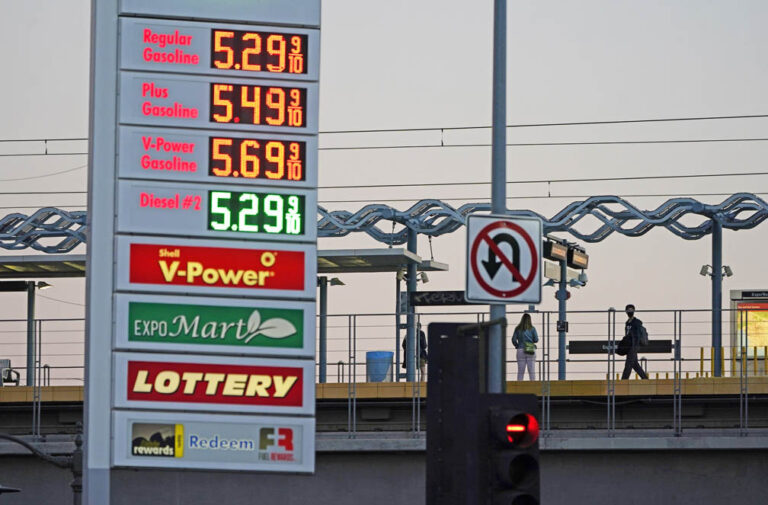NEW YORK — With Russia intensifying its war on Ukraine, killing civilians and triggering a mass refugee crisis, President Joe Biden on Tuesday announced a U.S. ban on imported Russian oil, sending the prices of diesel fuel and gasoline even higher.
Diesel prices have risen 74.5 cents per gallon in one week to a record $4.849 a gallon, according to the Energy Information Administration. Diesel’s previous high was $4.764 a gallon in July 2008.
California, where diesel is averaging $5.759 a gallon, has the nation’s highest prices. The largest increase, 85 cents, was seen in the Lower Atlantic, where it now costs $4.919 a gallon.
Mike Perkins is an independent driver based out of Michigan. He said it’s costing more than $1,000 for him to fill up on diesel, and he’s currently traveling the country to 48 states right now.
“It’s pretty tough,” Perkins said, describing the diesel prices to news station KPIC in Oregon. “Luckily, I haul for a company that does charge extra fuel surcharges to try to cover the cost of the extra fuel. But that just means the consumer has to pay it in the end.”
Perkins said he’s just lucky he gets paid on time, unlike some truck drivers who don’t.
But despite the hike in fuel prices, Perkins says covering fuel expenses partially comes out of his income.
“I hold 300 gallons of fuel, and the last fuel I got was in California. It was $5.86 a gallon.”
This week in Oregon, the lowest price for diesel is $3.65, found at the JL Mini Mart in Portland. And the highest is $5.13 at Chevron in Prineville, according to gasbuddy.com.
IJana Jarvis, the president of Oregon Trucking Associations, says diesel prices have gone up 6% in the last two weeks.
“The fact of the matter is, these escalating prices will get passed on to consumers and the prices of goods,” Jarvis told KPIC. “And that’s just what’s happening. You’re seeing it on your grocery store shelves and everything you’re purchasing lately. We’re seeing inflationary impacts on all kinds of consumer goods.”
Critics of Russia have said that sanctioning its energy exports would be the best — perhaps only — way to force Moscow to pull back.
A full embargo would be most effective if it included European allies, which are also desperate to stop the violence in Ukraine and the danger Moscow poses to the continent. Yet it’s far from clear that all of Europe would take part in an embargo, though Britain announced Tuesday that it would phase out Russian oil imports by year’s end.
Unlike the United States, Europe is deeply reliant on energy it imports from Russia, the world’s second-largest crude oil exporter behind Saudi Arabia. While the U.S. could replace the relatively small amount of fuel it receives from Moscow, Europe could not, at least not anytime soon.
What’s more, any curbs on Russian oil exports could send already skyrocketing oil and gasoline prices ever higher on both continents and further squeeze consumers, businesses, financial markets and the global economy.
Here is a deeper look:
WHAT WILL HAPPEN WITH A U.S. BAN ON RUSSIAN OIL?
With gasoline prices in the U.S. surging ever higher, the Biden administration has faced growing pressure to impose further sanctions on Russia, including a ban on oil imports.
For now, a broad U.S.-European ban appears elusive. On Monday, German Chancellor Olaf Scholz made clear that his country, Europe’s largest consumer of Russian energy, has no plans to join in any ban. In response, U.S. Deputy Secretary of State Wendy Sherman hinted that the U.S. could act alone or with a smaller group of allies.
“Not every country has done exactly the same thing,” Sherman said, “but we have all reached a threshold that is necessary to impose the severe costs that we have all agreed to.”
DOES THE U.S. BAN ON RUSSIAN OIL HURT MOSCOW?
The impact on Russia would likely be minimal. The United States imports a small share of Russia’s oil exports and doesn’t buy any of its natural gas.
Last year, roughly 8% of U.S. imports of oil and petroleum products came from Russia. Together, the imports totaled the equivalent of 245 million barrels in 2021, which was roughly 672,000 barrels of oil and petroleum products a day. But imports of Russian oil have been declining rapidly as buyers shunned the fuel.
Because the amount of oil the U.S. imports from Russia is modest, Russia could potentially sell that oil elsewhere, perhaps in China or India. Still, it would probably have to sell it at a steep discount, because fewer and fewer buyers are accepting Russian oil.
If Russia were eventually shut off from the global market, rogue countries such as Iran and Venezuela might be “welcomed back” as sources of oil, said Claudio Galimberti, an analyst at Rystad Energy. Such additional sources could, in turn, potentially stabilize prices.
A team of Biden administration officials were in Venezuela over the weekend to discuss energy and other issues, White House press secretary Jen Psaki said. She said officials discussed a range of issues, including energy security.
“By eliminating some of the demand, we’re forcing the price of Russian oil down, and that does reduce revenue to Russia,” said Kevin Book, managing director at Clearview Energy Partners. “In theory, it is a way of reducing how much Russia earns on every barrel it sells, maybe not by a lot, but by some. The most important question is whether there’s going to be more pressure on the other side of the Atlantic.”
HOW COULD A RUSSIAN OIL BAN AFFECT PRICES?
News of the U.S. oil ban sent gasoline prices surging, with a gallon of regular selling for an average of $4.17 Tuesday.
A month ago, oil was selling for about $90 a barrel. Now, prices are surging close to $130 a barrel as buyers shun Russian crude. Refiners had already feared being left with oil they couldn’t resell if sanctions were imposed.
Shell said Tuesday that it would stop buying Russian oil and natural gas and shut down its service stations, aviation fuels and other operations there, days after Ukraine’s foreign minister criticized the energy giant for continuing to buy Russian oil.
Energy analysts warn that prices could go as high to $160 or even $200 a barrel if buyers continue shunning Russian crude. That trend could send U.S. gasoline prices past $5 a gallon, a scenario Biden and other political figures are desperate to avoid.
“A U.S. embargo on Russian oil is very politically attractive right now,” said Morgan Bazilian, director of the Payne Institute at the Colorado School of Mines. Still, the same politicians now supporting the ban “will come back and hammer Biden if U.S. gasoline prices rise further as a result,” he said.
ARE RUSSIAN IMPORTS ALREADY FALLING?
The U.S. oil industry has said it shares the goal of reducing reliance on foreign energy sources and is committed to working with the Biden administration and Congress. Even without sanctions, some U.S. refiners have severed contracts with Russian companies. Imports of Russian crude oil and products have tumbled.
“Our industry has taken significant and meaningful steps to unwind relationships” with Russia and voluntarily limit Russian imports, said Frank Macchiarola, senior vice president of the American Petroleum Institute, the oil and gas industry’s largest lobbying group.
Preliminary data from the U.S. Energy Department shows that imports of Russian crude dropped to zero in the last week in February.
WILL EUROPE GO ALONG?
A ban on Russian oil and natural gas would be painful for Europe. Russia provides about 40% of Europe’s natural gas for home heating, electricity and industry uses and about a quarter of Europe’s oil. European officials are seeking ways to reduce their dependence, but it will take time.
Britain’s business secretary, Kwasi Kwarteng, said his country will use the rest of the year to phase out its imports of oil and petroleum products to “give the market, businesses and supply chains more than enough time to replace Russian imports,” which account for 8% of U.K. demand.
Germany’s economy minister, Robert Habeck, on Tuesday defended the European decision so far to exempt Russian energy from sanctions.
“The sanctions have been chosen deliberately so that they impact the Russian economy and the Putin regime seriously, but they also have been chosen deliberately so that we as an economy and a nation can keep them up for a long time,” Habeck said. “Ill-considered behavior could lead to exactly the opposite.”
“We have maneuvered ourselves into an ever-greater dependency on fossil energy imports from Russia in the last 20 years,” Habeck said. “That is not a good state of affairs.”
Deputy Prime Minister Alexander Novak of Russia underscored that urgency, saying Moscow would have “every right” to halt natural gas shipments to Europe through the Nord Stream 1 pipeline to retaliate against Germany for halting the parallel Nord Stream 2 pipeline, which wasn’t yet operating. Novak added that “we have not taken this decision” and that “no one would benefit from this.” His statement marked a shift from Russia’s earlier assurances that it had no intention of cutting off gas to Europe.
Oil is easier to replace than natural gas. Other countries could increase production of oil and ship it to Europe. But much oil would have to be replaced, and this would drive up prices even more because the oil would likely have to travel farther.
Replacing the natural gas that Russia provides to Europe is likely impossible in the short term. Most of the natural gas Russia provides to Europe travels through pipelines. To replace it, Europe would mostly import liquefied natural gas, known as LNG. The continent doesn’t have enough pipelines to distribute gas from coastal import facilities to farther reaches of the continent.
In January, two-thirds of American LNG exports went to Europe, according to S&P Global Platts.
While U.S. oil and gas producers could drill for more natural gas, its export facilities are already operating at capacity. Expanding those facilities would take years and billions of dollars.
The Trucker staff contributed to this report.
The Trucker News Staff produces engaging content for not only TheTrucker.com, but also The Trucker Newspaper, which has been serving the trucking industry for more than 30 years. With a focus on drivers, the Trucker News Staff aims to provide relevant, objective content pertaining to the trucking segment of the transportation industry. The Trucker News Staff is based in Little Rock, Arkansas.









The feds aren’t going to help with the current fuel crisis. They could care less about Americans fighting to survive a critical mess. The so called president won’t step in because he is afraid of puking Putin. We need to get serious about the trucking industry and as O/O. Companies like JB Hunt, CR England, Swift, etc don’t care either as they would pass the extra costs to the customer. As an O/O I will demand a fuel surcharge whenever I talk to a broker. If they won’t offer one I won’t pull their load. Pure and simple.